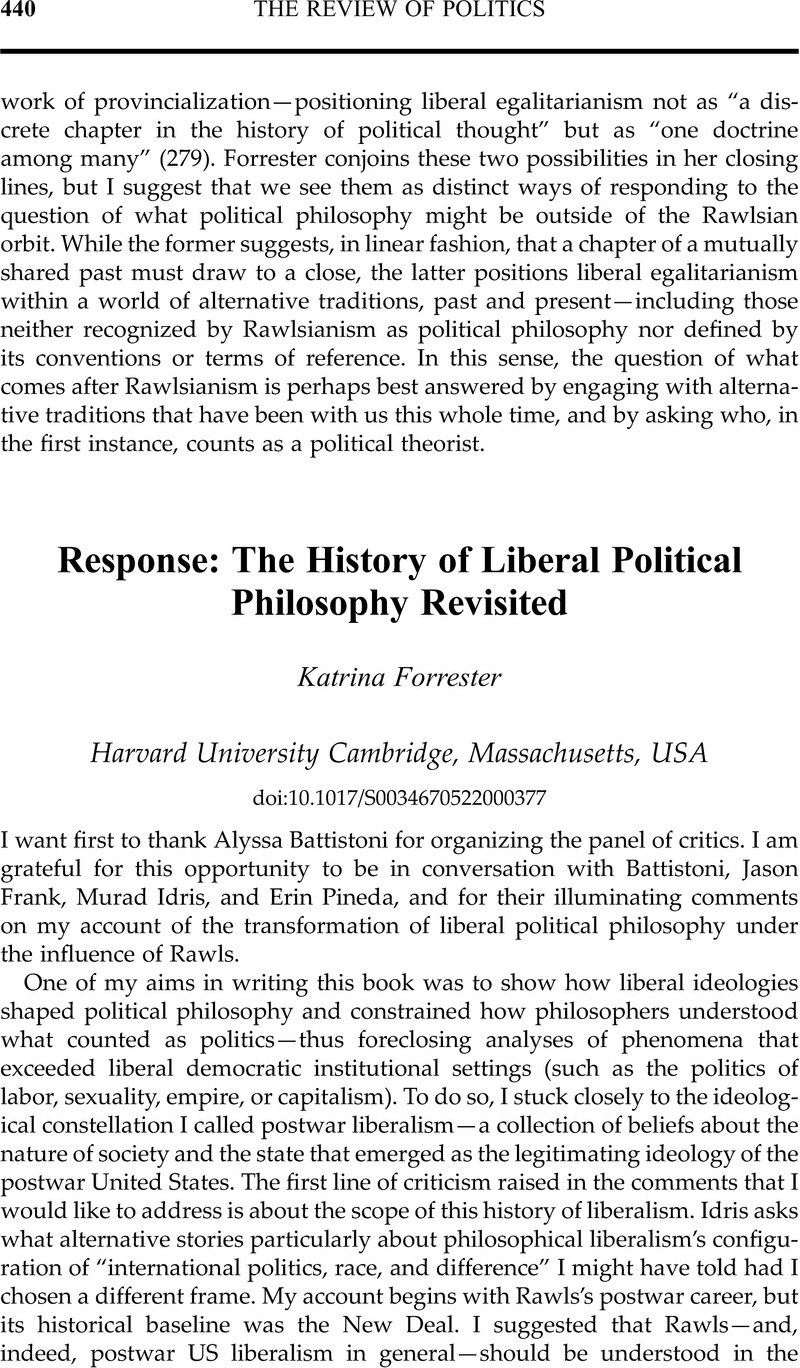Article contents
Response: The History of Liberal Political Philosophy Revisited - Katrina Forrester: In the Shadow of Justice: Postwar Liberalism and the Remaking of Political Philosophy. (Princeton, NJ: Princeton University Press, 2019. Pp. 432.)
Review products
Published online by Cambridge University Press: 18 July 2022
Abstract

- Type
- A Symposium on Katrina Forrester's In the Shadow of Justice: Postwar Liberalism and the Remaking of Political Philosophy
- Information
- Copyright
- Copyright © The Author(s), 2022. Published by Cambridge University Press on behalf of University of Notre Dame
References
1 See Kornhauser, Anne M., Debating the American State: Liberal Anxieties and the New Leviathan, 1930–1970 (Philadelphia: University of Pennsylvania Press, 2015)Google Scholar; and Amadae, S. M, Rationalizing Capitalist Democracy: The Cold War Origins of Rational Choice Liberalism (Chicago: University of Chicago Press, 2003)Google Scholar.
2 Murad Idris, “Islam, Rawls, and the Disciplinary Limits of Late Twentieth-Century Liberal Philosophy,” Modern Intellectual History 18, no. 4 (2021): 1034–57.
3 This line of critique was first put to me by Danielle Allen, by Melissa Schwartzberg in a forum on In the Shadow of Justice in October 2019 at New York University, and by Battistoni in H-Diplo Roundtable XXI-24 on In the Shadow of Justice (Jan. 2020). See also Sophie Smith, “Historicizing Rawls,” Modern Intellectual History 18, no. 4 (2021): 906–39.
4 Smith opens the door to this criticism when she paraphrases my call to look to “social theory, history, and political struggle” as a call to look to “social movements and history” (“Historicizing Rawls,” 939).
5 Nancy Fraser and Rahel Jaeggi, Capitalism: A Conversation in Critical Theory (Hoboken, NJ: Wiley, 2018). I develop this theme in Katrina Forrester, “Liberalism and Social Theory after John Rawls”, Analyse & Kritik, forthcoming 2022.
6 Erin Pineda, Seeing Like an Activist (Oxford: Oxford University Press, 2021).
7 For example see Brandon M. Terry and Tommie Shelby, introduction to To Shape a New World: Essays on the Political Philosophy of Martin Luther King Jr., ed. Terry and Shelby (Cambridge, MA: Harvard University Press, 2018), 1–15.
8 See, for example, Táíwò, Olúfẹ́mi O., Reconsidering Reparations (Oxford: Oxford University Press, 2022)CrossRefGoogle Scholar.
9 Bo Harvey, “Political Philosophy after Forrester's Rawls,” Legal Form: A Forum for Marxist Analysis and Critique, Jan. 3, 2022, https://legalform.blog/2022/01/03/harvey-forrester-rawls/.
- 1
- Cited by


